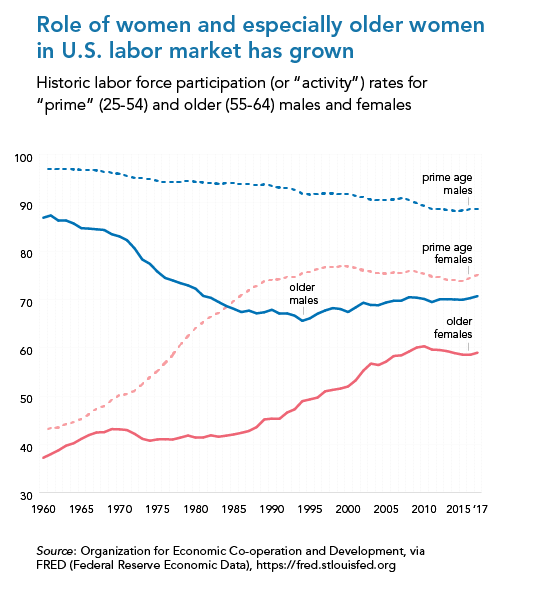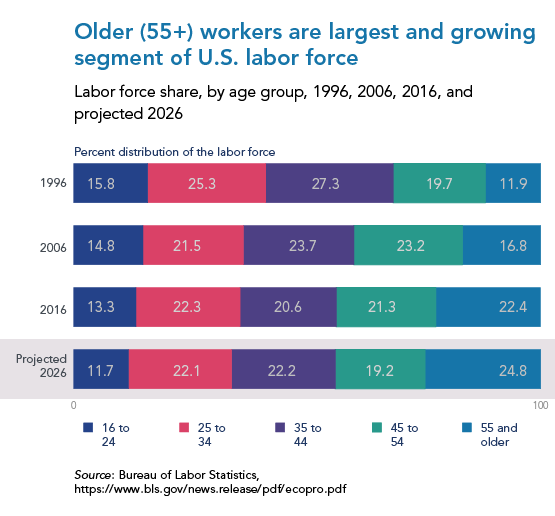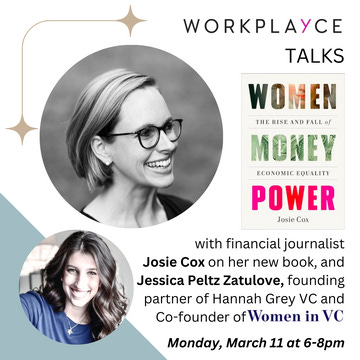The Cost of Workplaces Being Weird About Menopause
Women aged fifty-five and older represent the single fastest-growing segment of the American labor force. To a large extent our economy is failing them.

ALSO IN THIS POST…
Why are parents not taking advantage of parental benefits and policies?
Why are young people loving botox?
Latest on all things book: WOMEN MONEY POWER publishes March 5!
Some of us have just about mastered the art of talking about pregnancy in the workplace. Hurrah! But periods? God no. And menopause? Get out of here.
So one of the topics I tackle in my upcoming book, WOMEN MONEY POWER, is precisely this stigma, and by extension the economic cost associated with employers—as they so widely do—ignoring one of the most natural biological processes in the world.
I write about a 2022 research paper, based on a survey of over four thousand menopause-age women, according to which over 60 percent of respondents believe that menopause symptoms had significantly impacted their work performance. Some respondents even said that menopause was the reason they abandoned their careers altogether. I write that this is “a reality that’s not being addressed—a fact that is, for the most part, being entirely glossed over in the workforce.” So whenever it is addressed or alluded to, even if only in veiled, prettified terms, I have mixed feelings: anger and frustration at the extent to which addressing it is still so remarkable; but also hope that any degree of conversation and acknowledgment is the frontrunner to progress in this regard.
This week, I came across some research done in the U.K. which found that employers are sabotaging their own productivity and competitiveness by failing to provide female workers with adequate care and support for certain health conditions including, yes, menopause.
The study, conducted by affordable healthcare provider Benenden Health in collaboration with The Fawcett Society—a charity dedicated to promoting women’s rights—found that women in the U.K. miss an average of nine days of work each year due to health issues.
Of the female workers surveyed, more than two thirds—or 70%—said that they find it problematic dealing with their menstrual cycles at work. A similar proportion—62%—said that they face challenges related to pregnancy, and 64% said they have struggled with symptoms of the menopause while doing their job. Nearly two thirds of women said that they believe their health issues are not taken seriously.
“Research like this shows just how much work there is still to be done in even just beginning to understand how stark inequality is in the U.K. today, and in ways that can seem ‘invisible’,” said Jemima Olchawski, chief executive of the Fawcett Society. “The current system doesn’t work for anyone: women are being let down and the cost to business is enormous,” she added. Extrapolating from the data, the researchers concluded that almost 150 million working days are lost each year on account of women workers being absent.
I covered the research for Forbes and noted in that article that, more broadly and across all genders, the U.K. is contending with a health recession, of sorts.
Last April, The Institute for Public Policy Research, a think tank, published a report which found that between 2015 and 2022, chronic physical conditions are estimated to have driven 700,000 people in the U.K. to leave employment and forgo all their earned income. That report concluded that better health would improve economic prospects for all, but it also found that it could boost women’s earnings by twice as much as men’s.
Indeed, separate research has found that the U.K. has the largest gender health gap in the G20 group of economies, and the twelfth largest globally with women, for example, receiving worse treatment for conditions like dementia. As is the case in countless other countries around the world, women are also more likely to experience mental health problems than men, and, more broadly, less is known about conditions that only affect women, like common gynecological conditions that have the potential to dramatically undermine health and wellbeing in the workplace and beyond.
The Benenden Health and Fawcett Society research also found that four in ten—or 42%—of respondents said that they had heard derogatory comments about a female employee’s health in the workplace, often related to that employee taking time off work, being difficult to work with or not able to do their job properly. And as a result of this particular finding, it’s perhaps unsurprising that some 42% of women questioned said that they were reluctant to discuss their health issues with a manager. That figure drops dramatically, however, when the manager is a woman.
Women aged fifty-five and older represent the single fastest-growing segment of the American labor force. Yes, you read that correctly (see the graphs below). Many of the pioneers of women’s economic rights are now aging into that demographic bracket. According to one estimate, in the decade to the end of 2026, that group alone is expected to have accounted for more than a third of all workers entering the labor market: about 3.6 million individuals.
The age at which women tend to enter menopause—about forty-five to fifty-five— is typically also the age at which women have gained enough professional and life experience to enter the most senior and lucrative jobs in the labor market. The economic firepower of these people—if they’re afforded the opportunity and support to reach their full professional potential—would be enormous. But in many ways, the parameters of the workday don’t allow for this to happen.
Menopausal women would benefit from being able to work flexibly or part-time—for example, job sharing—so that they can fulfill their professional potential and ambition while also responding to their own health and well-being needs. These types of arrangements are still too rarely available, and, if they are available, women can be disparaged or discredited for taking advantage of them. In short, our economy is failing menopausal women.
The Benefit Stigma
Elsewhere last week, some more grim research also related to the workforce and gender gaps, but specifically demonstrating the enduring gap between policy and practice.
This study, also conducted in the U.K., by the advocacy group WOMBA in collaboration with Hult International Business School, found that even though workplace policies designed to support parents have improved and expanded in recent years, many workers are still not taking advantage of them out of concern that doing so would negatively affect their career progression.
Based on narrative interviews, the researchers found that mothers harbor fears of being judged as “less capable” or “less committed” and that, as a result, many are even driven to hide their “parental identities and responsibilities” at work. In some instances, this drives women who feel unable to balance their professional and personal duties to quit the paid labor market altogether.
At the same time, and despite separate research showing that the vast majority of men proclaim to want to be as involved in all aspects of childcare as women, the WOMBA and Hult study found that most fathers are still hesitant to take parental leave. The utilization of shared parental leave—a policy in the U.K. under which parents, regardless of gender, can share up to 50 weeks of leave and up to 37 weeks of pay—is well below 10% of those eligible.
Commenting on the findings, Alison Green, director of WOMBA, noted that a lack of psychological safety in the workplace is likely what’s preventing people from taking advantage of parental leave and other related benefits.
“Key to ensuring all parents can continue to progress their careers is for employers to invest in considered, family friendly policies, such as equal and enhanced parental leave, structured hybrid and flexible working, and specialist support,” Green said. “But to create tangible progress for working parents, investment must be underpinned by an aligned culture so all parents feel they can use support and arrangements designed for them, without detriment to their careers,” she added.
Green noted that in order for an employer to foster such a culture of psychological safety, managers need to lead by example and model behavior like taking advantage of benefits. And all employees should consider encouraging those workers who are more junior to them to use policies and benefits.
“Without a psychologically safe culture, policies will amount to little and organizations will fail to implement significant or lasting change,” she said.
Botox Babies
Finally this week, a quick mention of a silly (but perhaps not that silly?) essay I wrote for The Spectator magazine’s world edition about the young fans of botox and what this trend tells us about the pressures women still have to endure to comply with an unattainable ideal, regardless of their age.
Here’s an excerpt:
When we’re young, we romanticize old age: a time when we’ll be taken seriously, command authority and have no one to tell us what to do. When we’re old we romanticize youth: a time when our actions had no real consequences. Hakuna Matata. And a natural upshot of that is wanting to act old when we’re young, and young when we’re old. We want to be old enough to be respected but look young enough to be desired. I think of this as my five-year old (obvious-y still a few years away from understanding the weird age-related norms of society) surreptitiously snakes her tiny little finger into my anti-aging moisturizer. It’s quite possibly why young people get Botox and old people wear Forever 21.
To be clear, I have no problem with women of any age getting Botox, or indeed with doing anything that genuinely makes them feel better in their own skin. Let them eat cake! Let them feast on Ozempic! Let them decide for themselves if they want to shoot toxins into their faces to temporarily paralyze muscles and block nerves so that they can resemble a beauty ideal we long ago agreed was entirely unrealistic.
What I do have a problem with, though, is that a desire to be taken seriously is driving young women to fritter away their blink-and-you’ll-miss-it youthful beauty, not to mention their hard-earned cash.
I recently re-read Nora Ephron’s essay collection I Feel Bad About My Neck. In one essay she encourages young readers to “go, right this minute, put on a bikini and don’t take it off until you’re thirty-four.” My advice is in this same spirit. Before heading out to be needled, take a long hard look in the mirror and ask yourself whether those lines are real or imagined; whether you actually want your face to look like Madame Tussaud did your make-up (and if you do, then great. Go crazy.) or whether there’s another reason why Botox seems so wonderfully compelling. There are many ways to try and beat the patriarchy at its own game but, my goodness, most of us only get one good face in our lifetimes. Don’t screw it up for nothing.
You can read the full piece here.
WOMEN MONEY POWER: The Book
One week and one day to go. I’ve forgotten what fingernails are. And I’m oddly thrilled by all the things in my refrigerator that are due to expire after publication day. There were genuinely times when I thought this day would never come.
So please, do me a favor, and pre-order here or wherever you get good books. And share the love. Word of mouth recommendations are tremendously powerful. They make all the difference.
I’ve once again been busy recording podcast episodes this past week. Here’s one I did with financial planner and coach Julie Flynn and her incredible team who run the Women & Money Cafe podcast. You can subscribe to their YouTube channel here.
Earlier this month, I had the pleasure of joining Annette Young on her fantastic show The 51 Percent on France 24. We talked all things women, money and power, and why statistics only ever tell part of the story of progress or, indeed, of setback.
Watch the full clip here or below (from about 4:10!) and please appreciate my makeshift TV studio and especially my framed Shirley Chisholm campaign poster in the background.
Events
On March 4 (6pm), the evening before publication day, I’ll be reading from WOMEN MONEY POWER at the lovely Corner Bookstore on Manhattan’s Upper East Side. Drop me a note if you plan to attend. I’d love to see you there!
On March 11 (6pm) I’ll be in conversation with Jessica Peltz-Zatulove, founding partner of Hannah Grey VC and co-founder of Women in VC, at Workplayce on Manhattan’s Upper West Side. Ticket includes a copy of the book, drinks, snacks, and excellent networking. Buy yours here!
On March 26 (6pm) I’ll be speaking about the book at Dear Mama Coffee, up in Harlem next to Columbia Business School. I’ll be in conversation with Anushka Salinas, the President and COO of Rent the Runway. It’s free to attend but please register here!
Stay tuned for more New York City-based events and I’ll also be in London in April. I’ll be doing an event on Monday, April 8, in central London. More details very soon.






